News literacy takeaways from the Misinformation Dashboard: Election 2024
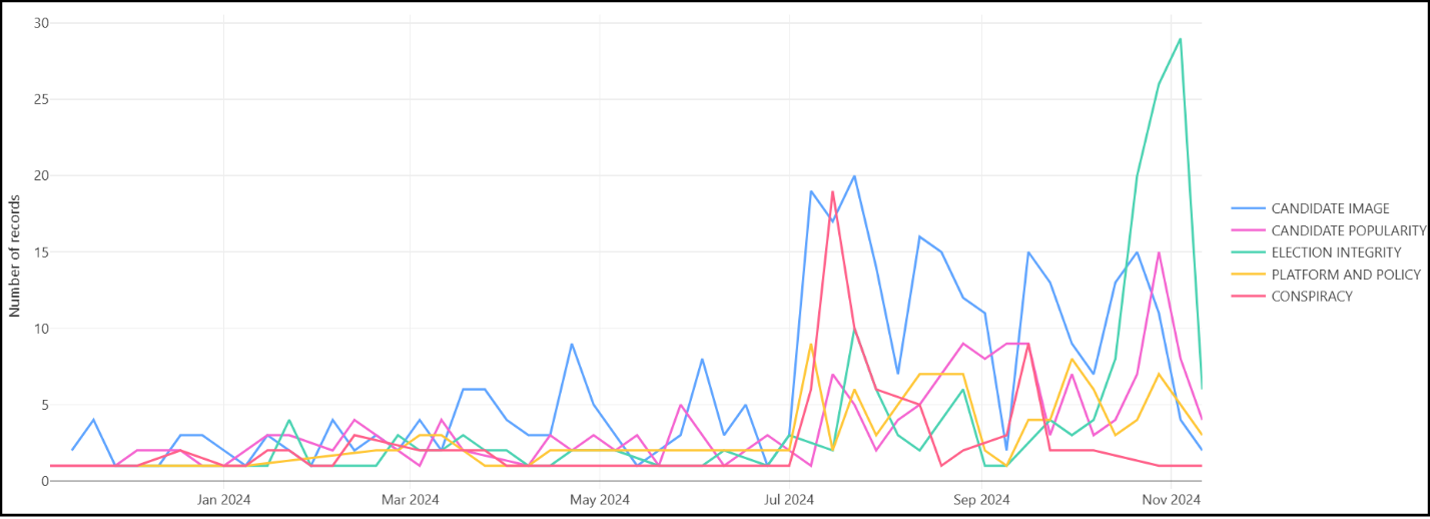
When the News Literacy Project launched the Misinformation Dashboard: Election 2024 last summer, the goal was to collect and track viral falsehoods to help people understand how they develop, and the narratives they attempt to create. With the presidential contest over, it’s time to end the work and review the news literacy lessons it provided.
Lies travel faster than the truth
Misinformation spreads in different ways. A genuine photograph removed from its original context, a manipulated image, or a picture generated with artificial intelligence can all be used on social media as “evidence” for a false claim. But after examining 941 pieces of false content, we found that misinformation spreaders eschew the need to offer any evidence at all. They just simply lie. We catalogued 147 viral falsehoods pushed using this “sheer assertion” tactic — making it the most popular of any we tracked.
AI still looms as a threat

One of unknowns that misinformation researchers faced at the start of election season was how artificial intelligence technologies would impact the information landscape. We certainly tracked falsehoods that were created with AI tools – including videos altered with fabricated voice clones, deepfakes that altered people’s facial movements, and images that looked like photos but were entirely fabricated – but AI-generated content wasn’t as widespread as expected. Only 6% of the 941 examples in the database involved its use.
Even fake popularity matters
Posts that exaggerate a candidate’s popularity made up a surprisingly large number of entries in the dashboard, accounting for nearly 20% of all false claims. Some involved the misrepresentation of crowd size, while others focused on endorsements (or disavowals) of celebrities. Musician Taylor Swift was the most frequently targeted celebrity, but creators of political disinformation also misleadingly cited other public figures and celebrities, such as Keanu Reeves, Michael Jordan, Elton John, Ryan Reynolds and Morgan Freeman.
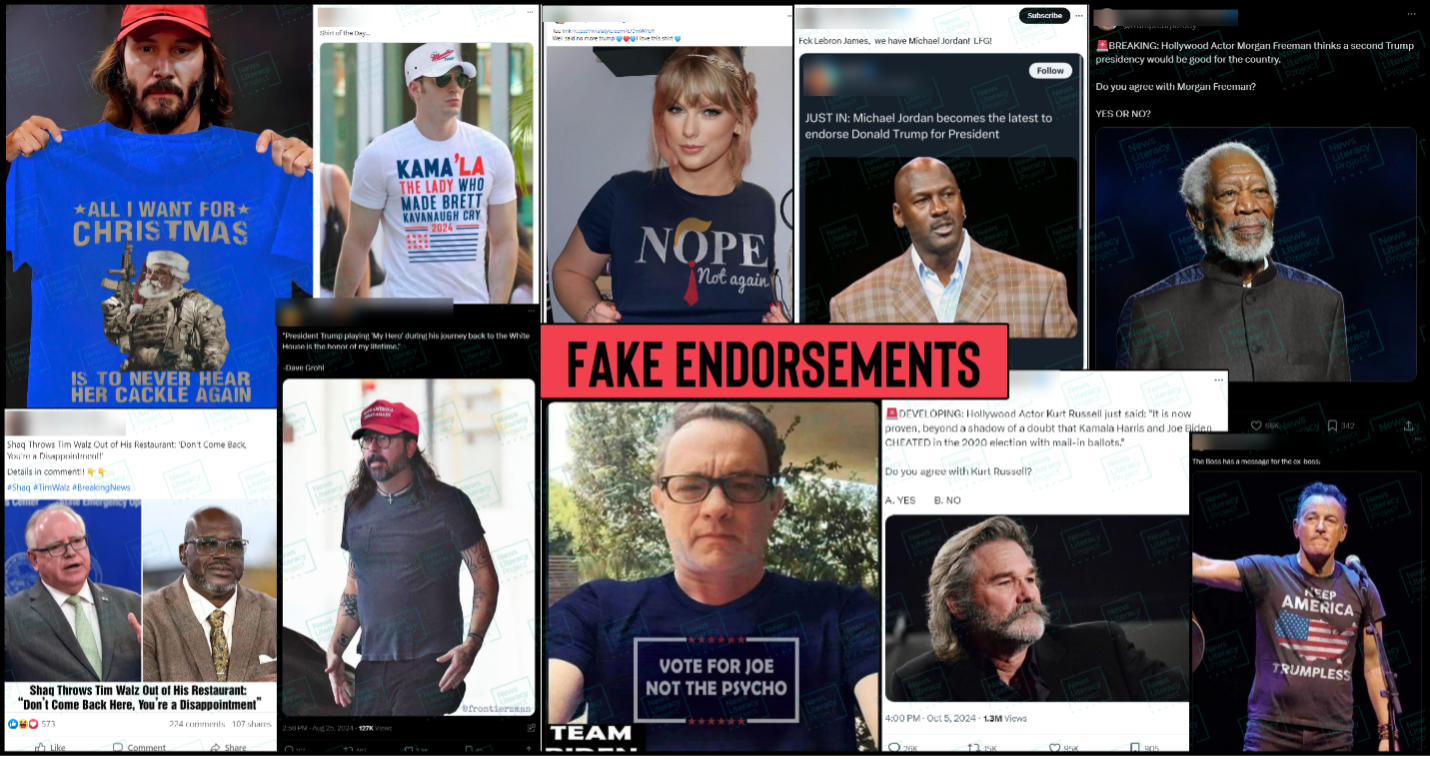
Fitness for office falsehoods grew
The most common narrative pushed by misinformation accounts during election season focused on the fitness of candidates for the presidency. These claims attacked both candidates and President Joe Biden from a variety of angles, including painting them as not smart enough, too old or even too intoxicated to perform the job.
News literacy skills make the difference
One thing all the election misinformation collected in the dashboard has in common: It can be easily debunked, using basic news literacy skills and habits. For example:
Dismissing sensational, evidence-free claims or checking them against high-quality, standards-based sources defuses sheer assertion claims. Reverse image searches put old or manipulated photographs back into their original context. “Lateral reading” (or a quick search for more information from other sources) uncovers credible information to dispel popular but false narratives. And slowing down helps prevent being misled by emotions and vulnerability to confirmation bias.
Falsehoods, of course, persist beyond the election. The misinformation dashboard will continue to be available as an archive. And NLP’s RumorGuard®, which debunks the latest examples of online misinformation, will continue.
Track the trends: Election integrity targeted by online disinformation
The News Literacy Project is tracking presidential election misinformation trends online. As voting day nears, let’s examine some of them, so we can make sure to cast our ballots based on facts, not falsehoods.
A batch of mail-in ballots cast for former President Donald Trump was not destroyed in Bucks County, Pennsylvania; a vacant address in Erie, Pennsylvania is not being used to register illegal voters; and voting machines are not systematically flipping votes in Georgia. The final days of the 2024 presidential election are motivating a spike in falsehoods aimed at undermining confidence in the electoral process in the United States.
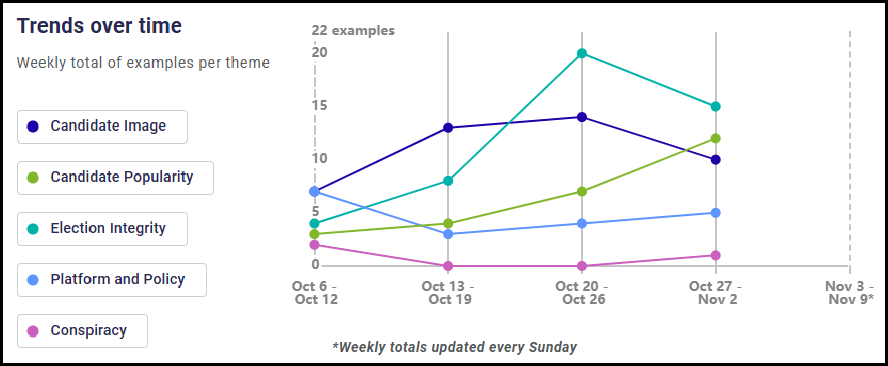
Noncitizens Voting
Falsehoods targeting the integrity of elections make up about 15% of all rumors in the News Literacy Project’s Misinformation Dashboard: Election 2024. These false claims have pushed narratives related to election interference, voter interference, and candidate eligibility, and the most common rumor is that noncitizens are illegally casting votes. Yet, as elections experts have repeatedly pointed out — noncitizens aren’t eligible to vote and instances of noncitizens casting a ballot are extraordinarily rare.
Election Night
Another target of election misinformation is the vote counting process itself. While falsehoods misrepresenting how ballots are being tallied already are frequent, this misinformation theme is likely to expand on election night as votes are counted. Here are a few disinformation trends to expect on Nov. 5:
- Surges in votes being misconstrued as fraud. Remember, counties around the country report their totals in batches, not by individual ballots, so it’s normal to see vote totals jump, especially as larger urban counties report their numbers.
- Premature declarations of victory. Some states have laws prohibiting processing mail or absentee ballots until Election Day, making it difficult to announce a winner on election night. Nonetheless, candidates might prematurely declare themselves a winner and call for vote counting to stop. Delays in reporting results are normal, not voting fraud, and it may take days for states to tally results.
- Individual voting glitches misrepresented as widespread fraud. With tens of thousands of polling places across the country, unexpected things can happen. A power outage, a broken machine or a burst water pipe are just a few. Expect any of these kinds of individual anomalies to be weaponized and spread as evidence of cheating or fraud.
NewsLit Tip: False claims often go viral when they evoke an immediate emotional reaction, especially during a high-profile event like Election Day. Remember to slow down, stay skeptical, and check viral claims against credible sources before sharing sensational content online.
For even more disinformation trends, check out our new prebunking guide, a collaboration between the News Literacy Project and the Mental Immunity Project.
Interested in learning more about the methodology we use to collect election-related falsehoods? Visit the Misinformation Dashboard and click on “Where we get our data.” You can also contribute: Use this form to submit a false claim that is not yet in the dashboard.
Related columns:
Track the trends: Candidate fitness and election integrity rank high in rumors
The News Literacy Project is tracking presidential election misinformation trends online. As voting day nears, let’s examine some of them, so we can make sure to cast our ballots based on facts, not falsehoods.
Fitness for the Job
The most common election misinformation narrative is that a candidate is unfit for the job.
False claims targeting Vice President Kamala Harris paint her as unintelligent or intoxicated. These falsehoods spread through a variety of tactics: short segments of her speeches presented out of context; video of her speaking slowed down to make her words sound slurred; voice actors used to create realistic parodies and quotes fabricated out of thin air. All were presented online as genuine. Be on the lookout for similar claims being pushed with these tactics.
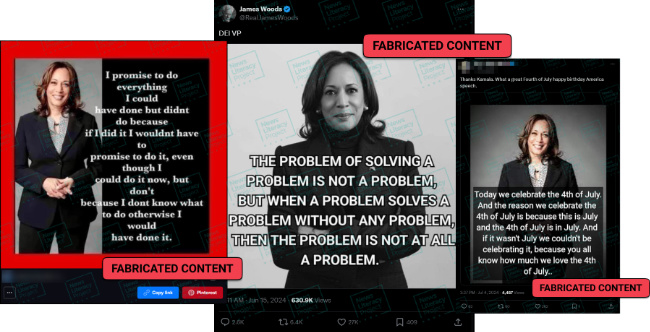
Former President Donald Trump’s mental acuity also is a focus of false attacks, and his physical appearance is frequently distorted on social media.
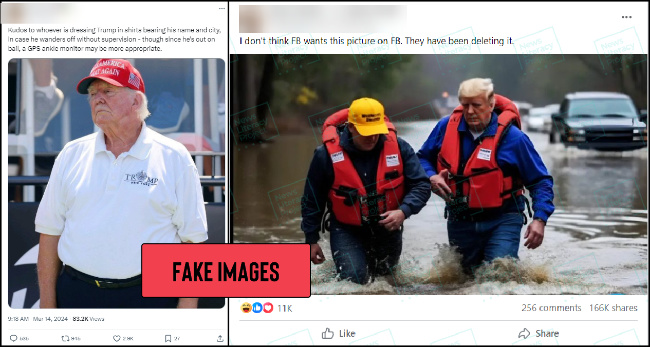
The image on the left circulated widely among Trump’s critics and the one on the right among supporters, but neither accurately depicts Trump. On social media, people can easily get siloed into feeds that provide a politically slanted view — one that feels “right” for the way it resonates with existing personal biases.
NewsLit Tip: NLP’s Misinformation Dashboard: Election 2024 contains numerous misinformation examples that involve distortions related to a candidate’s physical and mental fitness. These falsehoods tend to reinforce preconceived beliefs, so if you have ever thought to yourself, “It might as well be true” after encountering a provocative claim about a candidate, pause for a moment. Reassess your thinking to be sure your opinion of a post is based on accurate information and not your political leaning.
Casting doubt on casting votes
A large portion of the claims in the database target the election itself, with falsehoods attempting to cast doubt about the results. These falsehoods rehashed debunked rumors from 2020, presented standard election procedures out of context, and misconstrued voter registration data. But the most common false narrative in this category is that noncitizens are able to vote.
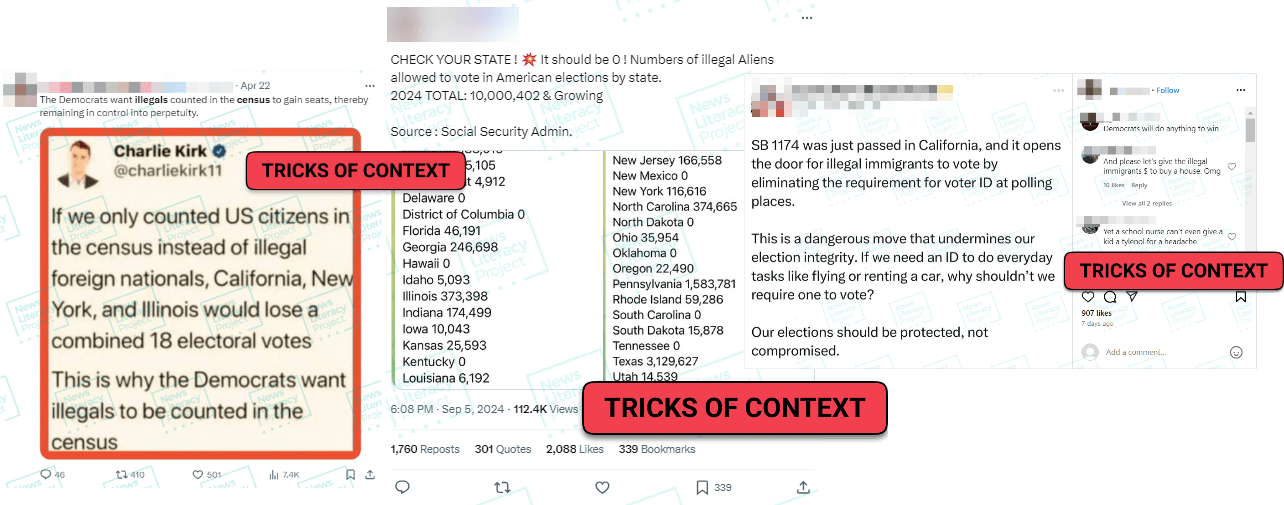
Noncitizens are not legally allowed to vote in the presidential election and there is no evidence to support these voter fraud claims.
False claims about election fraud are bound to spread in the days leading up and following Election Day on Nov. 5, 2024. Be sure that you are getting your information from reputable standards-based sources. And, if you see a shocking claim from an individual account, make sure to check it against standards-based news reporting.
Interested in learning more about the methodology we use to collect election-related falsehoods? Visit the Misinformation Dashboard and click on “Where we get our data.” You can also contribute: Use this form to submit a false claim that is not yet in the dashboard.
Related columns:
Pittsburgh Post-Gazette features News Literacy Project’s election misinformation dashboard
The News Literacy Project’s election misinformation dashboard was prominently featured in an article examining the falsehoods proliferating during this year’s elections. Experts in the fields of public health and political misinformation assessed NLP’s data reflecting hundreds of false claims about the candidates and the election, and spoke of the confusion that murky information causes among would-be voters.
Read the piece in the Pittsburgh Post-Gazette (paywall) here. Visit the News Literacy Project’s Misinformation Dashboard: Election 2024 here. Read more about the misinformation trends NLP is tracking here.
Track the trends: Disinformation disguised as ‘breaking news’
Welcome back to our blog series focused on the Misinformation Dashboard: Election 2024, a tool for exploring trends and analysis related to falsehoods regarding the candidates and voting process.
Hours before the June presidential debate between former President Donald Trump and President Joe Biden, an X account posted a “breaking news” story claiming that CNN would implement a one- to two-minute live delay to edit footage before broadcasting it.
The claim was entirely made up, and the word “BREAKING” was used to pass it off as a credible news report. It worked. The post amassed more than 2 million views.
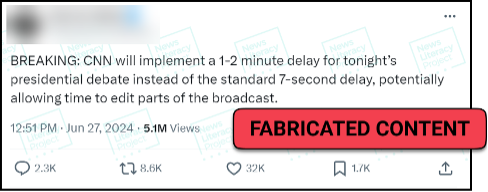
Standards-based news outlets use terms like “breaking news” to signal important developments in an ongoing story. But these alerts have been co-opted by purveyors of disinformation to create fake urgency and spread “breaking” news stories that are neither breaking nor news.
Watch this video compilation of some of the fake “breaking news” we’ve encountered about the election:
The Sheer Volume of Sheer Assertions
NLP’s Misinformation Dashboard: Election 2024 catalogs examples of election misinformation — tracking trends, types and themes. While propagandists have ample tools to create false and misleading content, the most widely used tactic is simply to conjure false claims out of thin air. These “sheer assertions,” as they’re known, make up about 15% of all claims in NLP’s database.
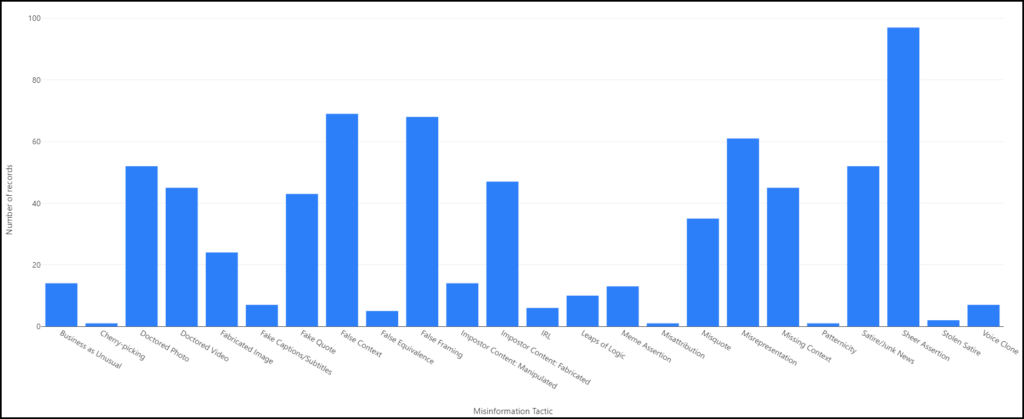
Data from NLP’s misinformation dashboard shows that “sheer assertion” is the leading tactic used to spread misinformation.
On social media, sheer assertion claims about breaking news events are among the fastest to surface and are published recklessly, before all the facts emerge. Journalists report breaking news by interviewing sources, checking data, verifying facts and updating coverage as needed. On the other hand, charlatans — many of whom claim to be doing “citizen journalism” — co-opt journalism lingo to push out baseless speculation or fabrications in mere seconds.
Newslit tip
Social media posts with breaking news language — including “breaking,” “developing,” and “exclusive” — warrant careful examination. Investigate an account’s profile to see if it is connected to a credible news outlet or has a history of publishing accurate information.
Don’t be misled by use of journalism terminology to make these alerts seem authentic. They miss two important aspects of credible reporting: multiple sources and evidence.
As Mark Twain once never said: “A lie can travel halfway around the world while the truth is still putting on its shoes.” Reliable information develops slowly during a breaking news event. Remember that bad actors attempt to fill that void with false claims.
A claim is not evidence
Along with sheer assertions, there are other rumor tactics tied to breaking news events:
- Sensational claims attributed to a single, unnamed “source.”
- Generic photographs that don’t support the claim or add to the supposed story.
- Nonsensical accusations that the media is “ignoring” a story or that a “blackout” has been issued to prevent coverage.
- False attributions to credible news outlets.
Doing real journalism is difficult and takes time. But producing falsehoods of almost any sort is comparatively easy and quick. But of all the tactics people use to spread misinformation, pushing out evidence-free assertions might require the least amount of effort. While this tactic is popular, it is also easy to spot and debunk. Just remember to check your sources, look for evidence and slow your scroll on social media to allow time for credible information to emerge.
This is part of a limited email series that analyzes trends and offers analysis based on the News Literacy Project’s Misinformation Dashboard: Election 2024. Subscribe to the series here.
Related columns:
The Conversation features NLP’s election misinformation dashboard, suggests ways to keep a healthy ‘political information diet’
There are ways to prepare and maintain your social media feed during the election season to better “manage your political information diet.” The News Literacy Project’s Misinformation Dashboard: Election 2024 is highlighted as a reason to be cautious in believing everything you see. The dashboard list hundreds of instances of altered photos, videos and misleading memes being used to spread falsehoods about the candidates and voting. If need be, step away from the scrolling for a bit, the article recommends.
Read the article in The Conversation here. Visit the News Literacy Project’s Misinformation Dashboard: Election 2024 here. Read more about the election misinformation trends NLP is tracking here.
Track the trends: Is it AI or is it authentic?
Welcome back to our blog series focused on the Misinformation Dashboard: Election 2024, a tool for exploring trends and analysis related to falsehoods regarding the candidates and voting process.
The prevalence of content generated by artificial intelligence has made it more difficult to differentiate between fact and fiction. Widely available AI tools allow people to create photo-realistic but entirely fabricated images, but how often are these fakes being passed off as genuine and used to spread misinformation and what can we do to identify and debunk them?
One of the goals of the News Literacy Project’s Misinformation Dashboard: Election 2024 is to monitor the use of AI-generated content to spread falsehoods about the presidential race. Now, with about 700 examples cataloged, let’s look at the impact.
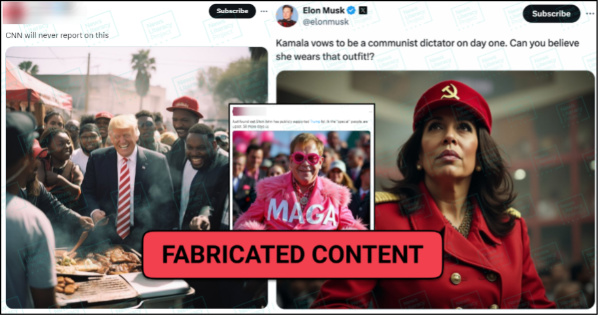
Not the main source of misinformation
Researchers have long warned that AI-generated content could release a flood of falsehoods. And while there has certainly been an uptick in these fabrications, their use in election-related rumors has not been as widespread as predicted. NLP has found that AI-generated content has been used in only about 7% of the examples we’ve documented.

Completely fabricated images of former President Donald Trump, President Joe Biden or Vice President Kamala Harris make up most of the AI-generated content in NLP’s database. These digital creations can be used to bolster a candidate’s reputation — such as fabricated images showing Biden in military fatigues or Trump praying in a church — or to denigrate their character — like fabricated images of Harris in communist garb or Trump being arrested.
AI can be used to make “photos” that distort a candidate’s relationship with certain groups or people. NLP’s database includes several AI-generated images depicting Trump with Black voters, as well as a number of images that falsely depict candidates posing with criminals or dictators, such as the late convicted sex offender Jeffrey Epstein:

The impact of AI: Question everything
Generative AI technology is behind a concerning trend in how people approach online content: fostering cynicism and “deep doubt.” It has led to a prevailing belief that it is impossible to determine if anything is real. This attitude is now being exploited by accounts falsely claiming that genuine photographs are AI creations.
When enthusiastic crowds turned out at rallies for Harris in August, falsehoods circulated online attempting to downplay the support by claiming that the visuals were AI-generated. This same tactic was used after a photograph emerged that showed a group of extended family members of vice-presidential nominee Tim Walz offering their support to Trump. The photo of Walz’s second cousins — not his immediate family — was authentic, although efforts were made to dismiss it as AI-generated.
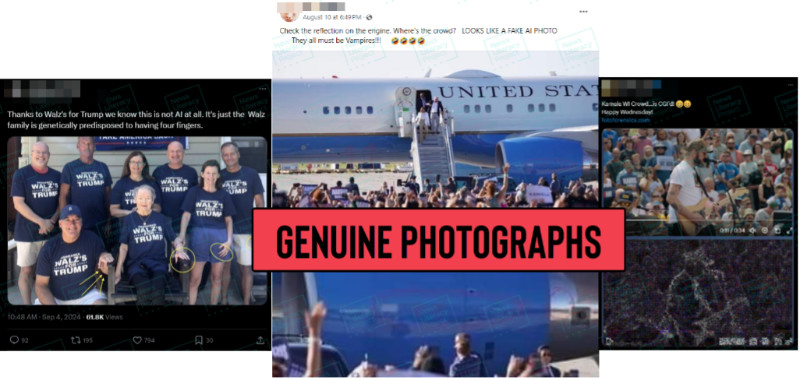
Low-tech solutions to high-tech problems
While the existence of AI fakes may make it feel like it is impossible to tell what is real, there is some good news. Whether a photograph is manipulated with computer software, an image is fabricated with an AI-image generator or a piece of media is shared out of context, the methods to identify, address and debunk these fakes remain the same.
- Consider the source. Who is sharing the content, and do they have a track record of posting accurate information in good faith?
- What is the original source of a photo? The lack of a credit is a red flag. Look for supporting evidence. Have any standards-based news outlets also shared the image?
When it comes to AI images, you may not be able to trust your own eyes. Slowing down to consider these key pieces of context is the best way to approach any content online — whether it’s real or created by AI.
Visit the Misinformation Dashboard: Election 2024
You can find additional resources to help you identify falsehoods and recognize credible election information on our resource page, Election 2024: Be informed, not misled.
Related columns:
‘Transparency is key’ when it comes to journalism and AI, NLP tells Pennsylvania’s TribLive
An article that explores the role of artificial intelligence in journalism quoted NLP’s Hannah Covington on the importance of newsrooms engaging their audiences in decisions about how they use the technology.
“Transparency is key,” said Covington, Senior Director of Education Content. “I think these decisions, when a news organization is looking at AI, should be made with input from audiences.”
For news consumers, Covington offered this advice: “It’s important to not let AI undermine your trust in all news and information.”
Read the full article here. Explore more about on NLP’s resource page, News Literacy in the age of AI.
In Washington Post newsletter, NLP provides insight on new report about misinformation on TikTok
The Washington Post’s Tech Brief newsletter dove into a new report that studies how TikTok users navigate misinformation on the social platform. Hannah Covington, Senior Director of Education Content at the News Literacy Project, provided analysis about why some of the findings are worrisome.
“I’m glad that some of the people surveyed indicated they expect to encounter mis- and disinformation on TikTok, and even expressed confidence in spotting it,” Covington said. “But people are often overconfident in their own ability to fact-check.”
Read the full newsletter here.
CBS Philadelphia highlights NLP’s Misinformation Dashboard: Election 2024
Voters should be on the lookout for AI-generated misinformation and other false rumors about the presidential elections, warned a CBS News Philadelphia report that highlighted the News Literacy Project’s Misinformation Dashboard: Election 2024.
Peter Adams, Senior Vice President of Research and Design at NLP, explained that the dashboard helps voters identify misinformation trends so they can avoid them. The stakes are high, he said.
“When we have divergent understandings of what actually is and isn’t real or factual, democracy falters,” Adams said.
Watch the full piece here. Visit the Misinformation Dashboard: Election 2024. Or explore more resources at Election 2024: Be informed, not misled.
Watch out for divisive claims about immigration, NLP warns in NBC News piece
NBC News tracked down the origins of viral rumors that claimed Venezuelan gangs had taken over an apartment complex in Colorado, and linked to a post on RumorGuard®, the News Literacy Project’s digital resource that helps debunk falsehoods.
Christina Veiga, NLP’s Senior Director of Media Relations, cautioned that misinformation about immigrants has been widespread this election cycle.
“People need to be aware that immigration is a common theme that misinformers are exploiting this election season. We should be extra cautious when we come across claims that seem designed to provoke anger, outrage, or fear — or that seem designed to divide us,” she said.
Read the full piece here. Visit NLP’s Misinformation Dashboard: Election 2024. Or explore more resources at Election 2024: Be informed, not misled.
Ipsos’ magazine on ‘Why news literacy matters more than ever’
The monthly magazine focused on what’s in store for the news industry and the importance of news literacy.
The September issue of What the Future, a monthly magazine by market research and consulting firm Ipsos, focused on what’s in store for the news industry and the importance of news literacy.
Peter Adams, Senior Vice President of Research and Design NLP, noted in a Q-and-A that, “students are inheriting the largest and most complex information environment in human history.”
“If we don’t teach them media literacy, we’re actively disempowering them civically. We kind of owe it to them,” Adams said.
Read the full story here.
AARP turns to NLP for tips on how to access credible news sources
Trying to stay informed with credible news sources can be hard when you hit a paywall. In an AARP magazine feature, the News Literacy Project’s Kymberly Deane, Senior Manager of Development, suggested a workaround.
“I’m a big fan of news aggregators and apps,” she said. “I love having the ability to customize my news feed to topics I really care about and having a range of sources to refer to conveniently.”
Read the full piece here. (Page 6 of special section, Tech for Everybody.)
CNN uses NLP’s misinformation dashboard to report on fake celebrity endorsements
A common theme of rumors swirling this election season claim that celebrities like Taylor Swift and Aaron Rodgers have endorsed – or snubbed – the presidential candidates, according to a CNN analysis of data in the News Literacy Project’s Misinformation Dashboard: Election 2024.
CNN found that about 1 in 10 rumors in the dashboard dealt with these false claims.
“If you repeatedly see these falsehoods that exaggerate a candidate’s popularity, it can still stick, even if you know it’s not legitimate as you scroll past it in your feed,” said Peter Adams, NLP’s Senior Vice President of Research and Design.
Read the full piece here. Watch the coverage here or here. Visit the Misinformation Dashboard: Election 2024. Or explore more resources at Election 2024: Be informed, not misled.
Track the trends: Stay ahead of these election falsehoods
Welcome back to our blog series focused on the Misinformation Dashboard: Election 2024, a tool for exploring trends and analysis related to falsehoods regarding the candidates and voting process.
As of today, NLP’s Misinformation Dashboard: Election 2024 contains more than 600 hundred examples of online falsehoods. By categorizing them by themes and narratives, we provide important insights about trends and patterns in the misinformation spreading about this year’s presidential race.
The role of repetition
Ever heard the phrase, if you “repeat a lie often enough … it becomes the truth”? It’s often credited to Nazi Joseph Goebbels, one of the most notorious and malevolent propagandists in history. This law of propaganda drives much of the misinformation we find online. Our vulnerability to oft-repeated falsehoods and the “illusion of truth” effect makes it crucial to understand the common themes and narratives of viral misinformation
Candidate’s cognition a common theme

Claims that exaggerate and distort candidates’ cognitive abilities and intellect are the most frequent in our collection. This was true when President Joe Biden was the presumptive Democratic nominee running against former President Donald Trump, with many false claims attacking the candidate’s age. And the trend has continued with Vice President Kamala Harris. It’s important to note that these overall narratives are not entirely fabricated (all three politicians have had their share of public gaffes), but they appeal to our natural desire to confirm our biases, providing an exaggerated and distorted glimpse of reality in which the candidates are reduced to caricatures of themselves. Are Trump and Harris both mentally fit to be president? Our dashboard isn’t designed to answer that. But it can help to make you aware of the spate of misinformation that intends to skew your viewpoint on this question.
You can’t see the forest for the trees
Debunking individual rumors — for example, proving that Trump did not “freeze” during a campaign speech or that Harris did not say that “the problem of solving a problem is not a problem”— only partly succeeds in combating misinformation. Those who create and share misinformation are doing more than just pushing an individual falsehood. They are making a concerted and sustained effort to manipulate our political views by repeating these claims to distort consensus reality, or our shared understanding of the world around us.
We need to prepare ourselves for the inevitable false claims that will fill our news feeds in the lead up to the 2024 election. The best way to do that is to shift our attention from individual posts of questionable content and focus more on broader trends. By learning to identify the false narratives that bad actors attempt to establish about candidates and the election process, we can spot them before they draw us in.
We will continue to add every election-related viral rumor we can find to our collection through Inauguration Day on Jan. 20, 2025. So, you might want to check the dashboard’s running tally of false claims as part of your daily news routine. We also will publish analyses of political misinformation here in the weeks to come.
New election misinformation dashboard tracks the trends
Election misinformation has been coming at us at such a furious clip this summer that you would have to be faster than an Olympic sprinter to outpace it. And even if you could, making sense of what you see and hear sometimes feels impossible.
That’s why we have created the Misinformation Dashboard: Election 2024. This free online resource collects examples of viral rumors, doctored images, conspiracy theories and AI-generated fakes. Because election misinformation poses an existential threat to democracy, individual fact-checks are not adequate to counter this danger.
The dashboard goes above and beyond by doing the following:
- Highlighting of-the-moment data.
- Analyzing common trends and topics within a larger context.
- Featuring dynamic visualizations that quickly illuminate information.
- Providing educators with real-time examples for the classroom and enhancing the understanding of journalists and researchers diving into election misinformation.
“Given how quickly falsehoods can congeal into deep-seated beliefs, it’s essential that all Americans learn to recognize viral election misinformation when they see it in their feeds,” said Senior Vice President of Research and Design Peter Adams, who led the development of the dashboard. “Healthy democracies flourish when civic discourse is anchored in accurate, shared understandings of issues and candidates. We hope this dashboard helps people preserve the integrity and power of their civic voices and their votes.”
Everything on the dashboard is interactive. Click on the two options at the top of it to explore election misinformation by theme or type. You’ll find examples of fabricated or manipulated content, false or misleading context and many forms of AI-generated deceptions. And we’re tracking the trends regarding election integrity, party platforms and the candidates themselves.
“Patterns in misinformation come into focus when content is collected in one place. The dashboard empowers people to see trends so they can avoid being swayed by falsehoods when they cast their votes,” said Dan Evon, NLP’s Senior Manager of Education Design, and a member of the team that developed the resource.
You can find additional resources to help you identify falsehoods and recognize credible election information on our resource page, Election 2024: Be informed, not misled.
Statement on the attempted assassination of former President Trump and the mis- and disinformation in its aftermath:
At the News Literacy Project, we join others in America deeply troubled by the attempt on former President Donald Trump’s life on July 13. While thankful that he was not seriously injured, we extend our condolences to the family of Corey Comperatore, a firefighter, father and husband who lost his life. We also send our wishes for a swift and full recovery to the two other men who were injured in the shooting. Political violence should hold no place in our democratic process and civic discourse.
Immediately after the shooting, rumors and unverified claims emanated from across the political spectrum and spread rapidly online. In breaking news situations, the facts constantly evolve during the hours that follow, and even in the days and weeks after. We should avoid the temptation to propagate opinions that could further fuel false and unverified claims, expand the reach of propaganda and hate speech, and potentially lead to further violence. We all are susceptible to confirmation bias because many of us live in media echo chambers that reinforce our beliefs and leave us blind to new facts that can put an event in context and improve our understanding of it.
For helpful resources on how to evaluate breaking news, avoid confirmation bias and understand conspiratorial thinking, follow our social media channels and visit our website, where we provide additional resources to help promote informed news consumption and empower you to combat the spread of harmful falsehoods.
Finding water in a news desert: Tips from three experts
Ellie Blanchard
Americans in 203 counties don’t have a local news outlet, recent research shows. During election season, a lack of local news presents a challenge to voters looking for vital information about ballot initiatives and candidates running for office.
As information becomes harder to find, especially in rural areas, the News Literacy Project convened three experts to share tips for finding reliable news before heading to the polls. For more ways to find credible election news, check out our elections resource hub.
💦 Sweat the details
To avoid being fooled by bad actors masquerading as local officials, learn to recognize legitimate election information that you find in your mailbox or online. Brianna Lennon, county clerk for Boone County, Missouri, advised looking for clues that a source is legitimate, like an official election mail insignia or a web address that ends in .gov.
 “In terms of finding out what’s on the ballot, the actual government website and the mail are the two biggest ways that people are going to find it.”
“In terms of finding out what’s on the ballot, the actual government website and the mail are the two biggest ways that people are going to find it.”
— Brianna Lennon
💡 Take responsibility
If your area lacks news coverage on local issues, turn to trusted community leaders to better understand candidate positions, suggested Benjy Hamm, director of the University of Kentucky’s Institute for Rural Journalism and Community Issues. “I call friends who deal with the court system… I talk to teachers about school board members,” he said. While this is a good starting point for getting information, be aware of biases and be sure to consult multiple sources.
 “There is a responsibility to vote, but there’s a greater responsibility to be an informed voter.”
“There is a responsibility to vote, but there’s a greater responsibility to be an informed voter.”
—Benjy Hamm
🤔 Think like a journalist
Without a formal voter guide from a local news outlet, you can operate like a journalist yourself to find important information. Alana Rocha, editor of the Rural News Network, encourages all voters to think critically when they see promotional flyers or texts. Seek news from a variety of sources and confirm claims by visiting candidates’ platforms directly.
 “Diversify your sources. Go to the person’s website to see what they have to say.”
“Diversify your sources. Go to the person’s website to see what they have to say.”
— Alana Rocha
Vetting election information
Vetting election information: How service members, veterans and military families can get credible voting information
Free
Virtual panel discussion
7 p.m. ET/4 p.m. PT Tuesday, May 21
As the 2024 election season is underway, falsehoods about voting and ballot issues already are circulating widely. Bad actors exploit a charged political atmosphere by spreading false claims about candidates, disinformation about how to vote and baseless rumors that undermine trust in election systems and infrastructure.
Military service members, veterans and their families in particular encounter conspiracy theories and other types of mis-and disinformation frequently. In a recent poll of Military Times readers, 57% said they personally have been targeted.
To break through this confusing and often misleading information landscape, the News Literacy Project is hosting a panel of experts who work with the military community for a virtual discussion about common types of election-related misinformation and practical tips and tools for finding reliable news sources before voting.
About the panelists
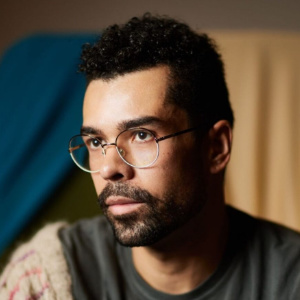
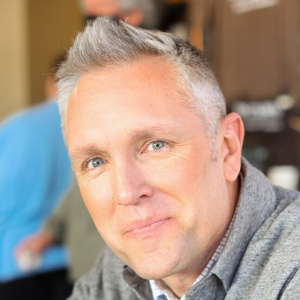
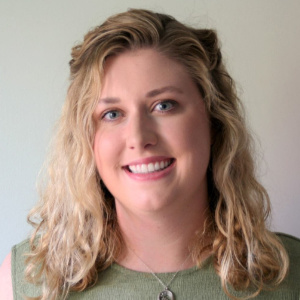
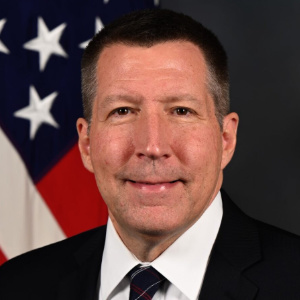
About the moderator
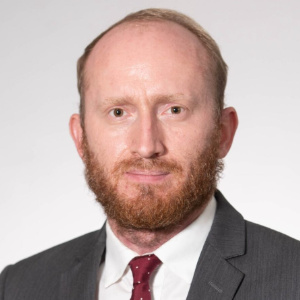
Finding water in a news desert
Finding water in a news desert
Preparing for elections when news coverage is scarce
Free
Virtual panel discussion
6 p.m. ET/3 p.m. PT Wednesday, April 24
When local news coverage is scarce, how do you find out what’s on the ballot in your community? As legacy news sources struggle – especially in rural areas – information becomes harder to find, and it can feel especially fraught as we prepare to vote. Meanwhile, pink-slime news outfits, which masquerade as local news sources but are funded by political partisans, and social media rumor mills are popping up to fill the void left by downsized or shuttered local news outlets.
Even with these challenges there are still ways you can be informed about ballot initiatives and candidates running for office – including reports on their spending and where they stand on the issues.
The News Literacy Project has invited three experts – Benjy Hamm, director of the University of Kentucky’s Institute for Rural Journalism and Community Issues; Alana Rocha, editor of the Rural News Network; and Brianna Lennon, county clerk for Boone County, Missouri and co-host of the podcast High Turnout Wide Margins – to walk us through how people living in news deserts can prepare to vote in 2024. We’ll talk about obstacles to finding credible information, as well as tools you can use to investigate the who, what, when, where, why and how of the 2024 elections.
About the panelists
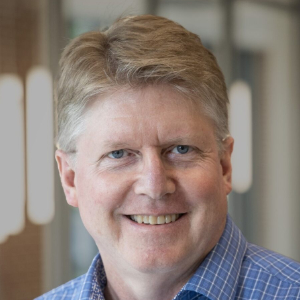
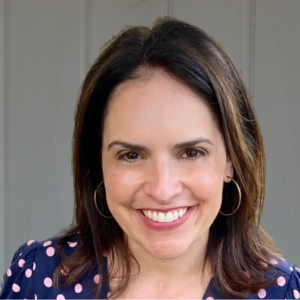
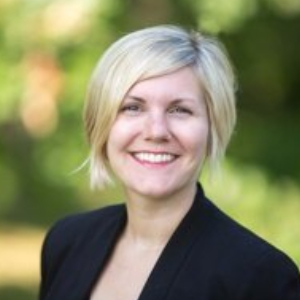
About the moderator
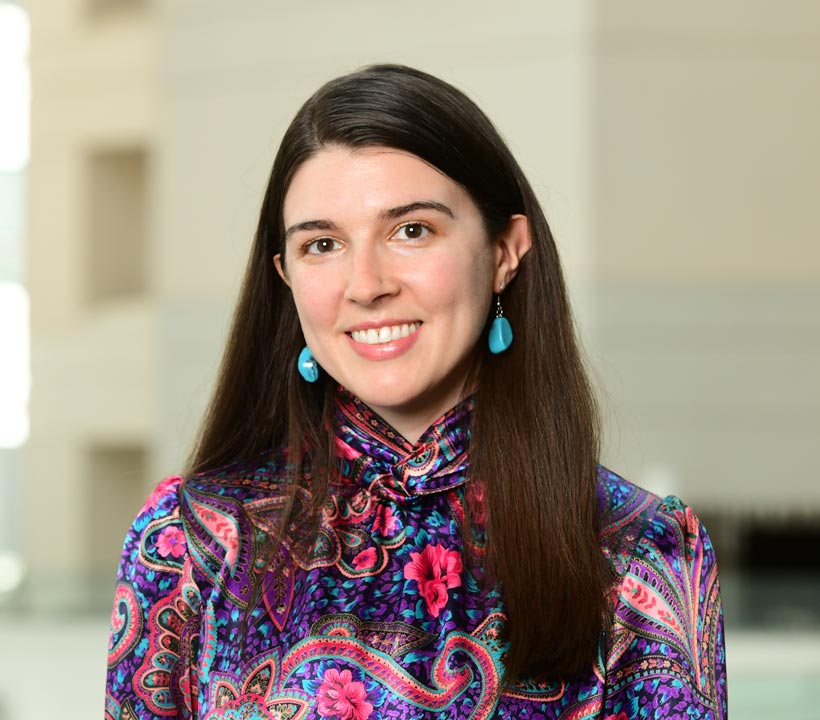
Are you informed or influenced?
Learn to identify credible election information in this free webinar Feb. 29, presented by the nonpartisan News Literacy Project.
Are you informed or influenced?
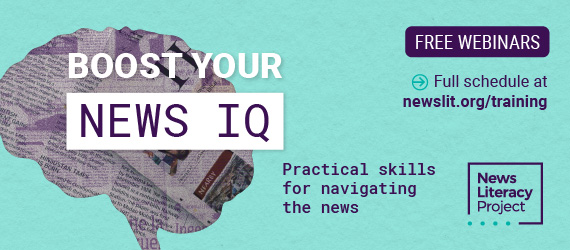
As we navigate the 2024 election, are we being informed or influenced?
This webinar will teach skills for identifying credible election information. We will learn how to evaluate the purpose of the information sources share, how to identify election misinformation trends and bias and how to prioritize finding credible sources.
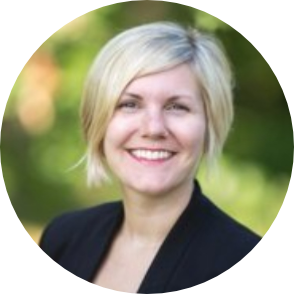 “In terms of finding out what’s on the ballot, the actual government website and the mail are the two biggest ways that people are going to find it.”
“In terms of finding out what’s on the ballot, the actual government website and the mail are the two biggest ways that people are going to find it.”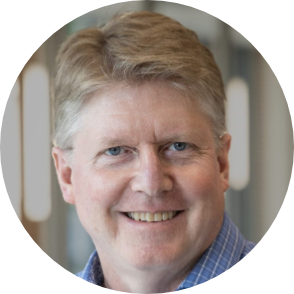 “There is a responsibility to vote, but there’s a greater responsibility to be an informed voter.”
“There is a responsibility to vote, but there’s a greater responsibility to be an informed voter.”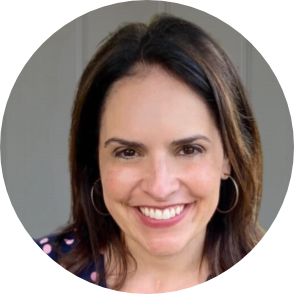 “Diversify your sources. Go to the person’s website to see what they have to say.”
“Diversify your sources. Go to the person’s website to see what they have to say.”